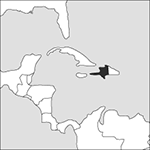
Capital:
Port-au-Prince
Area:
27,750 sq km (10,714 sq miles)
Population:
9,893,934 (2013 est)
Currency:
1 gourde = 100 centimes
Religions:
Roman Catholic 80.0%; Baptist 10.0%; Voodoo is also widely practised
Ethnic Groups:
Black 95.0%; Mulatto and White 5.0%
Languages:
Haitian (French) creole, French (both official)
International Organizations:
UN; OAS; CARICOM; WTO; Non‐Aligned Movement
A Caribbean country that occupies the western third of the island of Hispaniola.
Physical
The country is mainly mountainous with three main mountain ranges. Much of it is forested but the valleys support agriculture.
Economy
Haiti is a very poor country with over three-quarters of the population living in poverty. Subsistence farming is widespread. The only important export is clothing, and remittances from expatriates are the main source of foreign exchange. The economy was badly damaged by an earthquake in 2010.
History
Hispaniola was discovered by Columbus during his first voyage to the New World, and became a Spanish colony in the 16th century. French corsairs settled on the western part of the island in the 17th century and Spain recognized the French claims to the area in 1697 in the Treaty of Ryswick. Known as Saint Domingue in the 18th century, it became a rich source of sugar and coffee for the European market. African slaves replaced a decimated Indian population and by the end of the 18th century the population of Haiti was predominantly Black. French rule was challenged in 1791 by a slave insurrection led by Toussaint L’Ouverture.
The country declared its independence (1804) and Dessalines was proclaimed emperor. After his assassination (1806) a separate kingdom was set up in the north, while the south and west became republican. The country was re-united in 1820 as an independent republic. Haiti and the eastern part of the island (later the Dominican Republic) were united from 1822 to 1844. In 1859 it became a republic on its own again, whose anarchic history has been exacerbated by the hostility between the Black and mixed race communities. The USA, fearing that its investments were jeopardized and that Germany might seize Haiti, landed its marines (1915) and did not withdraw them until 1934. The country was dominated by President François Duvalier (1957–71), and by his son and successor, Jean Claude (1971–86). When the latter was exiled to France, a council assumed power. A new constitution and elections followed, but they in turn were followed by a series of military coups and violence under General Prosper Avril. Strikes and yet more violence ended his regime, and elections in December 1990 brought a dissident Roman Catholic priest, Jean-Bertrand Aristide, into office. In September 1991 rebel troops seized the President and civil violence flared up against a new military regime. Aristide fled to Venezuela and appealed to the Organization of American States (OAS) for help. OAS and US diplomatic efforts at restoring Aristide to office eventually led to the appointment by Aristide of a new Prime Minister, Robert Malval, in August 1993. An upsurge in army- and police-sponsored violence, however, prevented Aristide’s return, while international sanctions held the economy in a state of crisis. In September 1994 US troops landed on Haiti to oversee the transfer of power to Aristide, following an agreement with military leaders. Aristide returned in October and, in March 1995, military authority was transferred from the US-led multinational force to the UN Mission in Haiti (UNMIH). In mid-1995 the Lavalas Political Organization, endorsed by Aristide, won legislative elections marred by irregularities and violence. Presidential elections in 1995 were won by René Préval, an associate of Aristide. His presidency was dominated from 1997 by constitutional conflict with parliament and opposition parties, which was not resolved by the re-election of Aristide as President in 2000. Aristide was overthrown in 2004 by an insurrection and Boniface Alexandre became interim President. Préval was re-elected President in 2006; he was succeeded in 2011 by the conservative Michel Martelly, a popular singer. The first round of presidential elections, in which Martelly was constitutionally barred from standing, were held at the end of 2015, but, as a result of disputed results, the second round was repeatedly delayed. New elections were held in December 2016 and Jovenel Moïse, a businessman and choice of Martelly, was elected.
In 2010 Port-au-Prince was devastated by an earthquake that killed over 300,000 people and left over a million homeless. In October 2016, Hurricane Matthew hit southern Haiti causing major damage and killing around 1,000 people.
- Ionian school
- startup
- start-up file
- star twinkling
- starvation
- star world
- stasigenesis
- stasis
- Stas, Jean Servais
- STAT
- stat-
- Stata
- state
- statecharts
- state diagram
- State Earnings-Related Pension Scheme
- state enterprise
- stateful protocol
- stateful server
- state function
- stateless protocol
- stateless server
- statement
- statement label
- statement testing